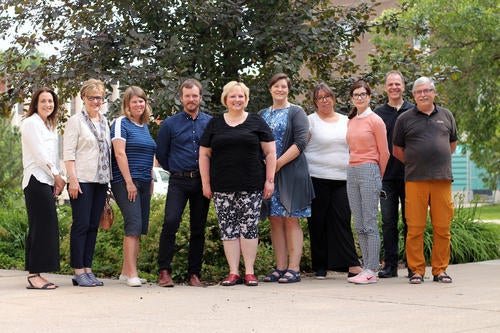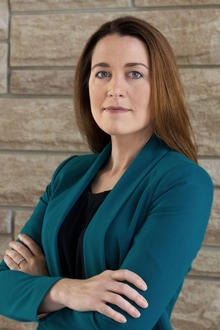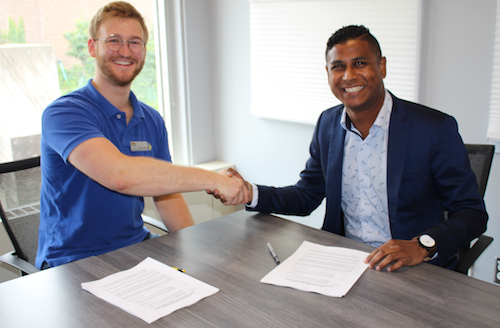The Daily Bulletin is published by Internal and Leadership Communications, part of University Communications
Contact us at bulletin@uwaterloo.ca
Submission guidelines
Editor:
Brandon Sweet
University Communications
bulletin@uwaterloo.ca

The "Thinking Historically for Canada's Future" executive team and partners met earlier this month at the University of Alberta.
by Melanie Scott.
Associate Professor Kristina Llewellyn of Renison University College is one of six executive members on a team that will oversee an $8.6 million-dollar project called “Thinking Historically for Canada’s Future”. The seven-year project, spearheaded by University of Alberta education professor Carla Peck, will examine how history is taught across Canada. It will also identify innovations in the classroom that help bring history to life and ways to get students engaged and thinking critically about history. The project will provide recommendations on how to develop better history curriculums and learning tools for Canadian students, and will lay the groundwork for the development of new digital and paper resources for K-12 teachers.
“The stories we teach about the past matter for who we are and what we value for our future,” said Professor Llewellyn, who teaches and writes about oral history. “Despite great change over time, we still emphasize teaching the facts about white man’s history in our schools. We need to engage young people in the making and questioning of inclusive historical narratives.” The “Thinking Historically” project will consider the 2015 recommendations of the Truth and Reconciliation Commission, which calls on governments to prepare mandatory school curriculum on the history of residential schools, treaties and the contributions of Indigenous people.
 Llewellyn’s interest lies in teaching more inclusive histories where young people engage with the experiences of older generations by gathering their stories. She believes that by focusing on lived experience, students can go beyond the memorization of facts about the past and begin thinking about historical significance, evidence, cause and consequence and more. She recalled a time in fourth grade when she was given an assignment to interview a senior family member. She interviewed a close family friend who was captured as a young man by the Nazis in the Netherlands under suspicion of being gay. The experience gave her a deeper knowledge, understanding and empathy for the events of WWII, much more than she could have gained from a textbook.
Llewellyn’s interest lies in teaching more inclusive histories where young people engage with the experiences of older generations by gathering their stories. She believes that by focusing on lived experience, students can go beyond the memorization of facts about the past and begin thinking about historical significance, evidence, cause and consequence and more. She recalled a time in fourth grade when she was given an assignment to interview a senior family member. She interviewed a close family friend who was captured as a young man by the Nazis in the Netherlands under suspicion of being gay. The experience gave her a deeper knowledge, understanding and empathy for the events of WWII, much more than she could have gained from a textbook.
Along with documenting the merits of oral history for the project, Llewellyn will bring her knowledge of using new technologies in the classroom, including virtual reality and gaming. Llewellyn is the Director of Digital Oral Histories for Reconciliation, which has created a VR-oral history curriculum with survivors of the Nova Scotia Home for Colored Children. These types of digital technologies allow young people to experience an active sense of history.
Renison and the University of Waterloo have provided matched funding for “Thinking Historically” which has received funding and in-kind contributions from 31 organizations, including museums, historical societies, teacher groups, indigenous organizations and others. It was recently awarded a $2.5-million grant from The Social Sciences and Humanities Research Council (SSHRC).
“There has been an incredible amount of support for this initiative from the University of Waterloo, including Renison University College” said Professor Llewellyn, who recently returned from a two-day executive team meeting at the University of Alberta. “This support shows how much the University cares about research with broad outreach for the public good, and demonstrates Waterloo’s desire to move the world forward through innovation.”

WUSA Vice President, Operations & Finance Seneca Velling and Studentcare Networks Ontario Program Manager Del Pereira (a former Feds finance VP himself) celebrating the signing of the legal representation agreement.
by Seneca J. Velling.
Waterloo undergraduates who elect to pay the Legal Protection Service fee ($9.56 termly for regular stream students, and $17.94 per academic term for co-op students) will now have access to a legal aid helpline and lawyers. The program covers legal representation for housing and tenancy, academic and employment rights, as well as a helpline for any legal questions.
The contract was negotiated over the last three months by our Vice President of Operations & Finance, Seneca Velling and approved by our Board of Directors on July 30, 2019. On August 15 it was executed by representatives of Studentcare and WUSA.
The Legal Protection Service covers an aid hotline that allows students to ask questions on any area of the law, including immigration and criminal matters. This can also be used to arrange review of their leases or sub-tenancy agreements for housing in the Waterloo Region, ensuring their landlord or property management firm complies with the Residential Tenancy Act and applicable city bylaws, including licensing.
For more information on housing & tenancy rights, please encourage students to check out our Local Advocacy webpage with work from our VP Education Matthew Gerrits.
Students are now able to access a lawyer on any issues related to: academic rights, housing & tenancy, and employment (including contracts). What does this look like?
If an item of concern is not listed above, students may still be eligible if it falls within those categories generally.
Legal service costs are covered by the program, including:
All full-time and part-time undergrads who are members of the Waterloo Undergraduate Student Association (WUSA, formerly Feds) and do not opt-out of the Legal Protective Service fee can access the program. This includes all international students, co-op students on officially recognized work terms, and anyone attending Waterloo or studying on an officially recognized exchange.
If students opt-out of the Legal Protection Service, they lose all access to resources including the toll-free legal helpline, as well as access to legal representation. Opting out at the beginning of the policy year precludes them from opting back in at any point during that policy year, with some exceptions.
If students have opted out and wish to opt back in, they can do so up until August 20. Changes to their account are not permitted after this date, and the most recent status will be applied. Direct students to their Quest Fees Statement to ensure they’re covered! For more information on their fees, they’re welcome to check out www.wusa.ca/fees.
AccessAbility Services, including the Exam Centre, will be closed on Wednesday, August 21 all day for staff training. The office will reopen on Thursday, August 22.
30 years ago: Saved by the Bell
Ontario Mennonite Music Camp, Sunday, August 11 to Friday, August 23, Conrad Grebel University College.
Quantum Key Distribution Summer School, Monday, August 19 to Friday, August 23.
More Feet on the Ground - Mental Health Training for Faculty and Staff, Monday, August 19, 9:30 a.m. to 12:00 p.m., NH 2447.
Deadline to get “Fees Arranged,” Tuesday, August 20.
Workday Drop-in Support, Tuesday, August 20, 9:00 a.m. to 11:30 a.m. and 1:30 p.m. to 4:00 p.m., EC1 1021.
Chemistry Seminar featuring Mikhail Zamkov, Professor, Department of Physics and Astronomy, Bowling Green State University, Ohio, “Colloidal Nanocrystals in Energy Transfer Reactions,” Wednesday, August 21, 2:30 p.m., C2-361 (reading room).
Pension Lunch and Learn session, Thursday, August 22, 12:00 p.m to 1:00 p.m., STC 1012.
Co-operative work term ends, Friday, August 23.
Warriors Football vs Toronto Home Opener, Minor League Day, First Responders and Military Appreciation Day, Alumni Day, Sunday, August 25, 7:00 p.m., Warrior Field.
QPR Mental Health Training for Faculty and Staff, Monday, August 26, 9:30 a.m. to 11:00 a.m., NH 2447.
Workday Drop-in Support, Tuesday, August 27, 9:00 a.m. to 11:30 a.m. and 1:30 p.m. to 4:00 p.m., EC1 1021.
Getting Started in LEARN, Wednesday, August 28.
Copyright for Teaching, Wednesday, August 28, 10:00 a.m. to 11:00 a.m., LIB 329.
Waterloo Women's Wednesdays: How to Set and Crush Your Goals, Wednesday, August 28, 12:00 p.m., MC 5479.
Fall 2019 Orientation schedule, Thursday, August 29 to Saturday, September 7.
NEW - First-Year Orientation, Saturday, August 31 to Saturday, September 7.
International Orientation, Thursday, August 29 to Saturday, August 31.
Exchange and Study Abroad Orientation, Thursday, August 29 to Saturday, August 31.
NEW - Parent and Family Orientation, Saturday, August 31 and Sunday, September 1.
Residence Move-In Days, Saturday, August 31 and Sunday, September 1.
Family Send-Off, Saturday, August 31, 2:30 p.m., Hagey Hub.
Transfer student orientation, Sunday, September 1.
Co-operative work term begins, Tuesday, September 3.
Lectures begin, Wednesday, September 4.
Getting Started in LEARN, Thursday, September 5.
WUSA First-Year Fair, Thursday, September 5, 10:30 a.m., Student Life Centre Great Hall.
NEW - Communication for the Workplace, Friday, September 6, 1:00 p.m. to 3:00 p.m., SCH 228F.
NEW – Graduate student orientation, Saturday, September 7.
NEW - Fall Welcome Week, Monday, September 9 to Thursday, September 12.
NEW - Fall Welcome Week: Warrior Breakfast, Monday, September 9, 8:00 a.m., Student Life Centre.
NEW - Fall Welcome Week: Sex Toy Bingo, Monday, September 9, 7:00 p.m.
NEW - Fall Welcome Week: Tinder Tales, Tuesday, September 10, 8:00 p.m. to 10:00 p.m., Humanities Theatre.
Systems Design Engineering. Zhou Zheng, “Capacitive Micromachined Ultrasonic Transducers (CMUTs) for Humidity Sensing.” Supervisor, Tze Yeow. On display in the Engineering graduate office, E7 7402. Oral defence Wednesday September 4, 2:00 p.m., EC4 2101A.
Chemistry. Hawa Gyamfi, “Proteing Engineering of Microbial Ferritins.” Supervisor, John Honek. On deposit in the Science graduate office, PHY 2013. Oral defence Wednesday September 4, 12:00 p.m., C2 361.
Philosophy. Catherine Klausen, “Knowledge, Justice, and Subjects with Cognitive or Developmental Disability.” Supervisor, David DeVidi. On deposit in the Arts graduate office, PAS 2428. Oral defence Thursday September 5, 9:30 a.m., PAS 2438.
Electrical & Computer Engineering. Lin Li, “Topological Insulator-Superconductor Heterostructures and Devices.” Supervisors, Guo-Xing Miao and Bo Cui. On display in the Engineering graduate office, E7 7402. Oral defence Thursday September 5, 2:00 p.m., EIT 3145.
The Daily Bulletin is published by Internal and Leadership Communications, part of University Communications
Contact us at bulletin@uwaterloo.ca
Submission guidelines
The University of Waterloo acknowledges that much of our work takes place on the traditional territory of the Neutral, Anishinaabeg, and Haudenosaunee peoples. Our main campus is situated on the Haldimand Tract, the land granted to the Six Nations that includes six miles on each side of the Grand River. Our active work toward reconciliation takes place across our campuses through research, learning, teaching, and community building, and is co-ordinated within the Office of Indigenous Relations.